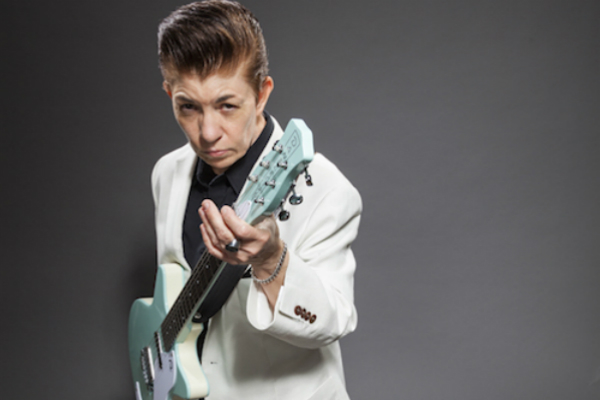The Musiq Scene is back and in full force! This time, I heard an incredibly unique narrative: one of a New York–born, Portland/LA–living FBI agent-turned-musician Susan SurfTone. Yes, you read that right. You may be wondering how one transitions from coast to coast, espionage to rock music… understandably, as did I. Through her work, notably her newly released music video Out of My Dreams, Susan pushes to challenge the statuds quo and raise the platform of LGBTQ+ visibility within mainstream media. She reflects on who inspires her, her career pivot, and her plans to be the first woman guitar hero.
When/how did you first become involved in music?
My mother took me to see Elvis Presley in “Jailhouse Rock” when I was three. I started listening to Elvis a lot when I was seven. The Beatles came to the U.S. when I was nine. I got a guitar and lessons. I learned how to play well and started a band in NYC in the mid-1980s.
What made you pivot your goals from government and FBI work to music?
It was inevitable. I went to college, then to law school and then to the FBI as a Special Agent but the desire to play rock and roll never left me. It was a “now or never” moment for me when I was 28. I was getting older and knew if I didn’t try for a career in music I would never be happy.
Who/what is your inspiration and why?
A few people particularly inspire me. Elvis Presley, because nobody ever did it better. He was a shy only child like me who got up on that stage and no one could touch him. John Lennon, because he had a unique voice in so many ways and a belief in his band that nothing could shake. Janis Joplin, because she put her entire being into her music and she was the first woman I saw front a band like a man did.
Why is music important to the queer community?
Music is a means of communication through the music itself and through what the artist represents in matters of personal experience, style, and so forth.
What do you hope to achieve as an artist?
To prove once and for all a guitar hero can be a woman. Women can play lead guitar just as well as men. We have been doing it for decades in blues and jazz. We just don’t know about these obscure female guitarists because men write music commentary and music history for the most part. I’ve started singing on my last few recordings. My next EP will be all Elvis, five vocal songs and two instrumentals. Now I want to show [that] a woman can handle the material of that most male of male icons do just as well. The EP will be called 2nd to One as a nod to Elvis’ album 2nd to None.
Did music play an integral role in your coming out? If yes, how so?
Music allowed me to express a side of me that was supposed to be suppressed. Music reveals a very real part of me. That aspect of me draws strength from music.
Given challenges facing our country and community, in your opinion, what is most needed for the queer community now? How can the music scene further that goal?
The queer community needs to realize we are in danger of losing the gains made in the past few decades. The Trump Administration is a real threat to us. He will drag us back to 1958 just to keep his minority base happy in the hopes they will let the Russian matter go because he’s forced us back in the closet. If he gets another Supreme Court appointment, we are in serious trouble. I think the queer community needs make our voice heard loud and clear in the mainstream. I do believe the majority of Americans are with us, but right now the majority is not in control of power and that’s what counts. I don’t think mainstream media is covering our issues in the era of Trump well enough. Music gave me the chance to write op-eds in The Advocate, and it gets me on LA Talk Radio to speak about the issues facing all of us. Music opened a door for me to actually have a voice that gets heard.


